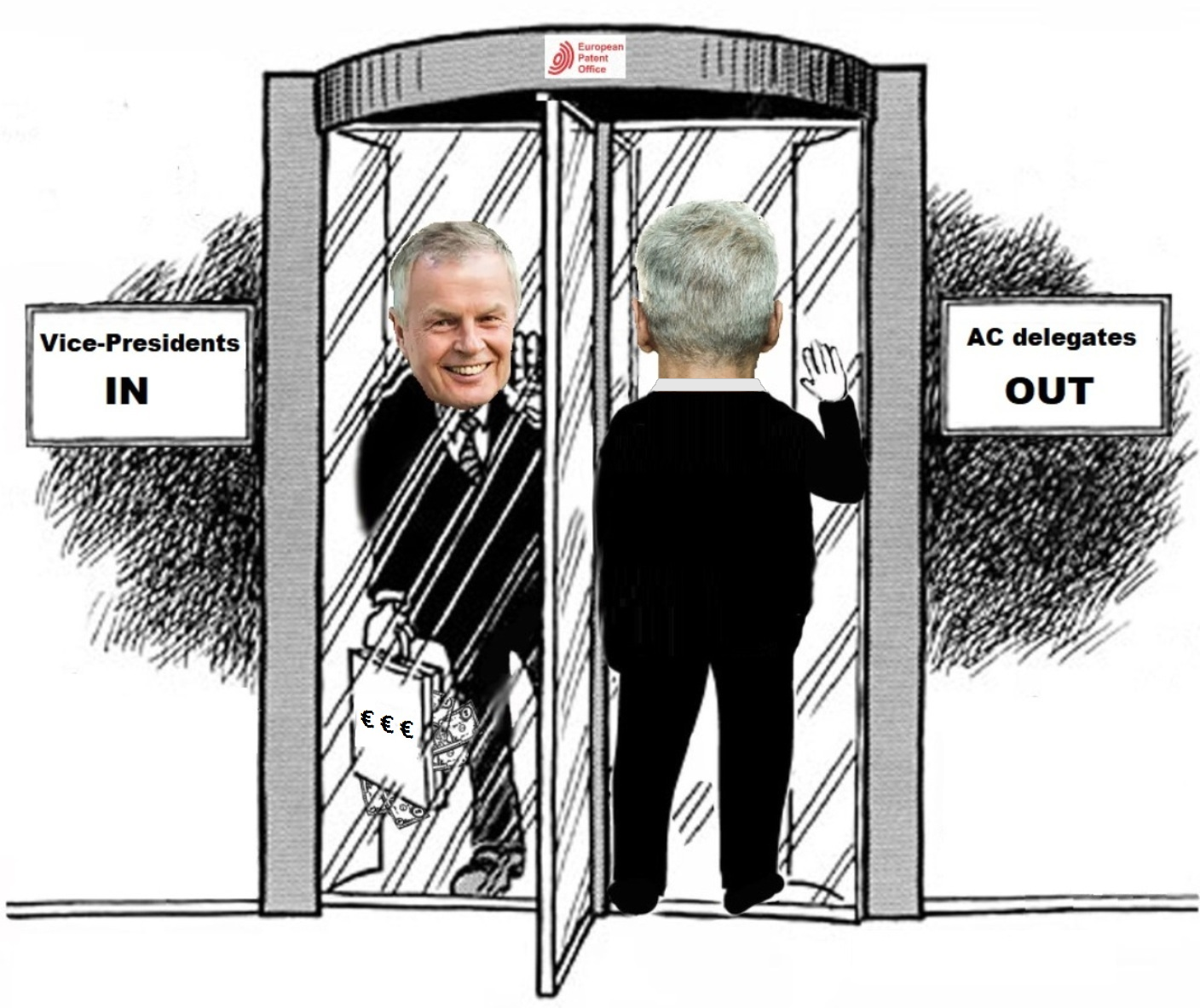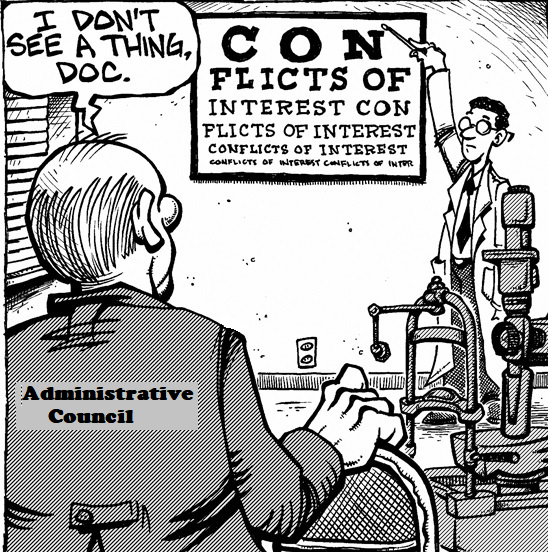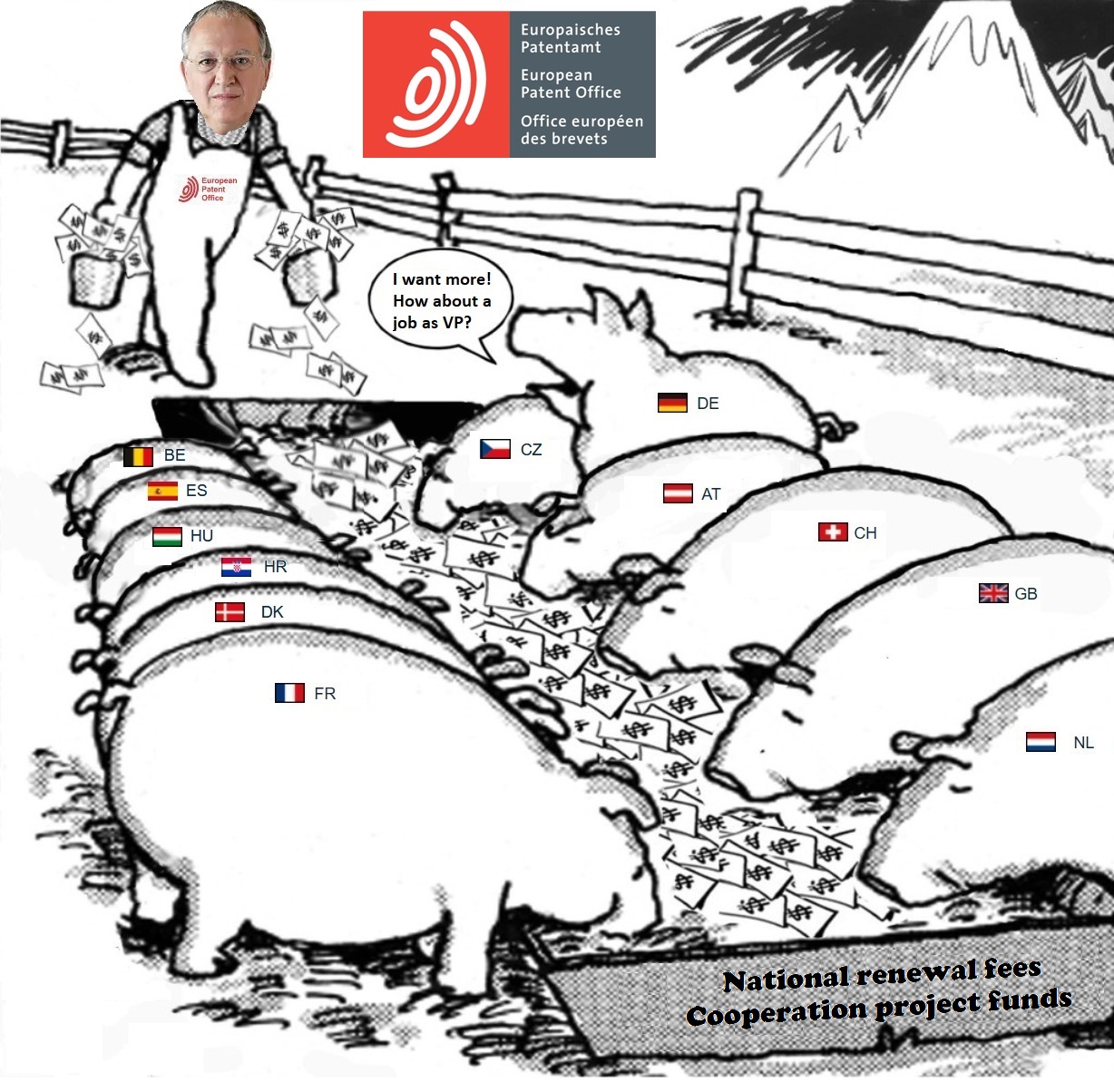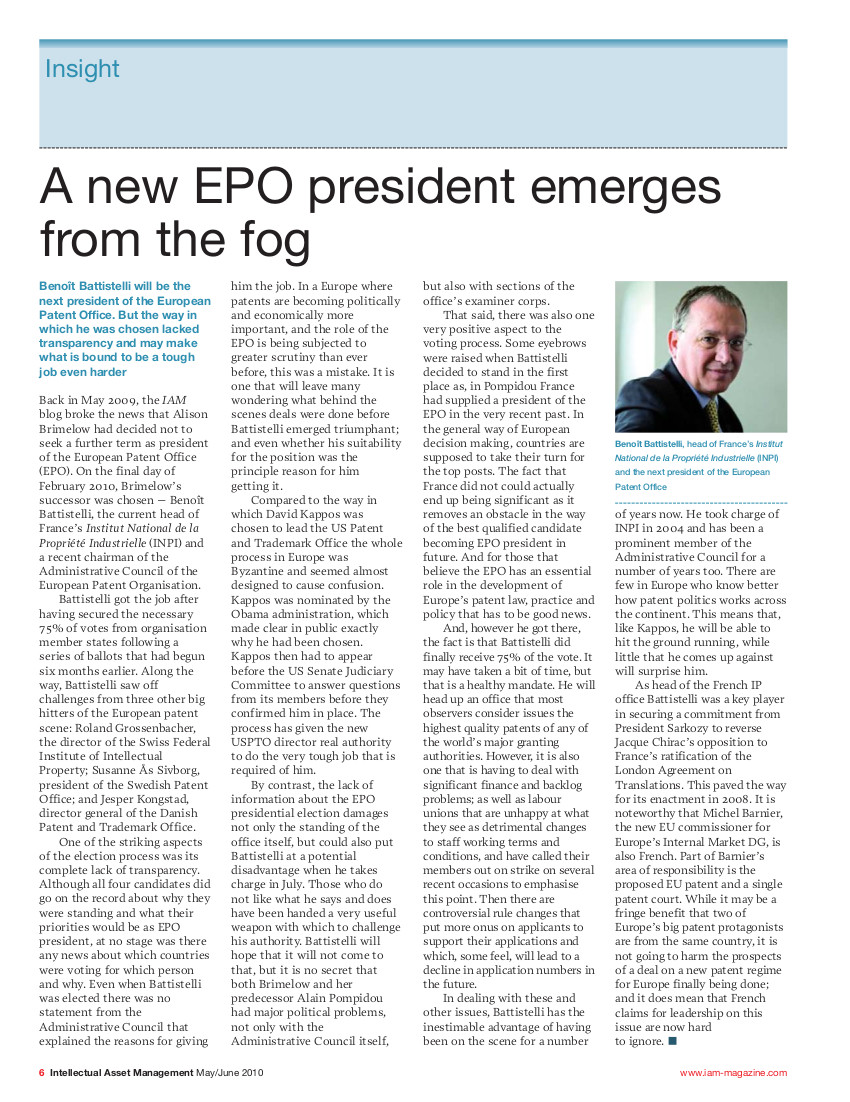

Christoph Ernst is one of the many beneficiaries of EPO's notorious revolving door arrangement.
Like his mentor Raimund Lutz, Christoph Ernst is a beneficiary of the well-known - not to say notorious - revolving door arrangement between the Administrative Council and the senior management of the European Patent Office.
"The conflicts of interest which can arise as a result of this set-up became very clear in the case of Battistelli who was elected as Chairman of the Council for a three-year term starting in March 2009."It has often been argued by EPO insiders and others that this arrangement is detrimental to the governance of the organisation and that it significantly weakens the Council's exercise of its supervisory authority over the Office.
The conflicts of interest which can arise as a result of this set-up became very clear in the case of Battistelli who was elected as Chairman of the Council for a three-year term starting in March 2009.
Battistelli had hardly taken up this position when he decided that he wanted to be President of the Office after Alison Brimelow announced in May 2009 that she would not be seeking an extension of her appointment (due to expire at the end of June 2010).
The records of the Council show that, in June 2009, Battistelli was responsible for drafting the document which set out the details of the vacancy notice for the position of EPO President and the election procedure to be followed.
This document (CA/103/09) included the "candidate profile" and requested that all applications be sent directly to Battistelli in his capacity as Council Chairman - despite the fact that he was planning to enter the running along with the other contenders, including the "alpha males" of the Council, Roland Grossenbacher and Jesper Kongstad.
"The records of the Council show that, in June 2009, Battistelli was responsible for drafting the document which set out the details of the vacancy notice for the position of EPO President and the election procedure to be followed."Battistelli's conduct in this regard gave rise to a long and heated discussion during the marathon three-day 118th meeting of the Council held in Munich from 23 to 25 June 2009. Some minutes/extracts are archived here [PDF].
There were outraged protests from various quarters, including the Austrian delegation which announced that it was "perplexed that [the election procedure document] CA/103/09 had been drawn up by a potential candidate for the presidency".
The Austrian delegation called for the Council to put on record that if its Chairman (Battistelli) and deputy Chairman (Kongstad) became candidates they could not perform their duties, not only for the actual election but for all agenda items at all meetings until the election was over.
In the end, the election procedure document drafted by Battistelli had to be revised twice - a first revision on 24 June followed by a second revision the next day - and the Council compelled Battistelli to step aside as its Chairman, at least until the election procedure was concluded.
After the selection of an interim Chairman - the head of the Spanish delegation, Alberto Casado Cerviño - a protracted election procedure involving several rounds of voting took place.
"In the end, the election procedure document drafted by Battistelli had to be revised twice - a first revision on 24 June followed by a second revision the next day - and the Council compelled Battistelli to step aside as its Chairman, at least until the election procedure was concluded."In March 2010, after much intransparent backroom wheeling and dealing, Battistelli finally managed to secure the requisite three-quarters majority of Council delegates.
This was despite the fact that, at the time in question, he held elected public office in France as a municipal councillor and deputy mayor for culture, and was actively affiliated to a political party, namely "Les Républicains".
It is recalled that at the time in question, this political party was led by Nicolas Sarkozy who in March of this year became the first former French President to receive a custodial sentence for corruption. Sarkozy is reputed to have strongly supported Battistelli's campaign to become President of the EPO.
Battistelli's holding of elected public office on a party ticket should have automatically disqualified him from being appointed to a senior managerial position in an international organisation.
But the Administrative Council remained oblivious to this unmistakable conflict of interest.

The Administrative Council appears to have difficulties recognising conflicts of interest.

The governance structures of the EPO create a situation with a huge potential for conflicts of interest.

The Council risks becoming overly preoccupied with divvying up the spoils.
"It is abundantly clear that the existence of a revolving door arrangement between the Council and the upper ranks of the Office management creates a situation which is not at all conducive to "good governance"."In addition to this, individual Council delegates who set their eyes on one of the available senior management positions in the Office administration run the risk of allowing their decision-making to become unduly influenced by their own personal ambitions. If this happens, it is likely that they will fail to exercise their role as members of the supervisory body in an appropriately objective manner.
As can be seen from the case of Christoph Ernst, the potential for such conflicts of interest is likely to be particularly acute when it comes to the Council Chair who is supposed to direct the meetings of the Council in a neutral and impartial manner and in the interests of the organisation as a whole.
It is abundantly clear that the existence of a revolving door arrangement between the Council and the upper ranks of the Office management creates a situation which is not at all conducive to "good governance".
The problems inherent in the existing institutional structures and practices are aggravated by the lack of any effective system of checks and balances to safeguard against abuses.
The decision to set-up an Audit Committee in 2009 was a first step towards tackling these issues.
However, the Audit Committee which was established by the Council under the Chairmanship of Battistelli in March 2009, vanished from the face of the earth in 2011.
"Moreover, by agreeing to Battistelli’s misguided proposal to disband the Audit Committee, the Council left itself bereft of any independent source of advice and information."As is well known, the disbanding of the Audit Committee took place on foot of a proposal submitted by the very same Battistelli who, in the meantime, had managed to reinvent himself as the President of the Office and liege lord of the Administrative Council.
Moreover, by agreeing to Battistelli's misguided proposal to disband the Audit Committee, the Council left itself bereft of any independent source of advice and information.
The highly detrimental consequences of the Council's supine compliance with Battistelli's machinations in this regard are plain to see - at least for all those who are not inclined to turn a blind eye to them.
In the next part we will conclude our review of Christoph Ernst's disappointing track record in the area of EPO governance and indulge in a little speculation about how someone with more integrity and backbone might have ended up as head of the German delegation during the Battistelli era.
For the record, here's IAM's puff piece about the new EPO President [PDF]. No criticism of course, as the EPO pays IAM through PR firms and the reciprocity complicity is seemingly endless. ⬆
